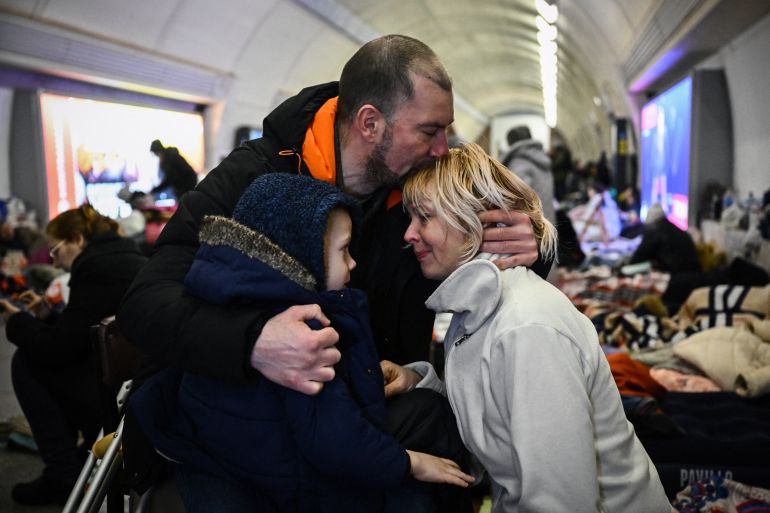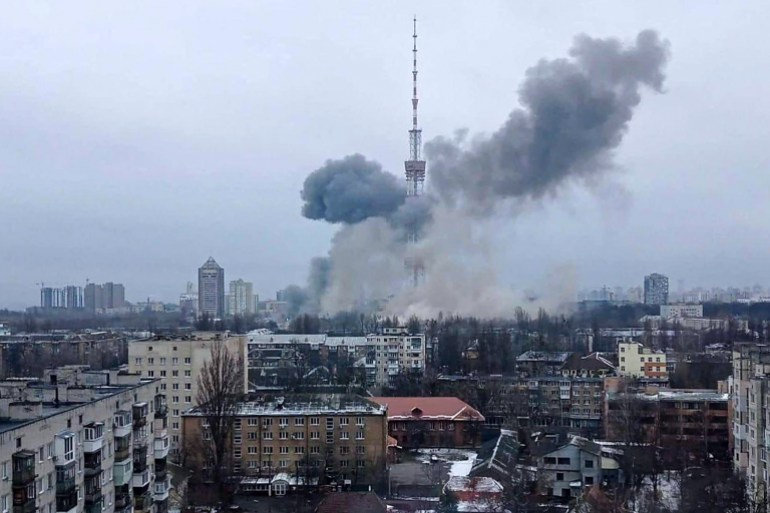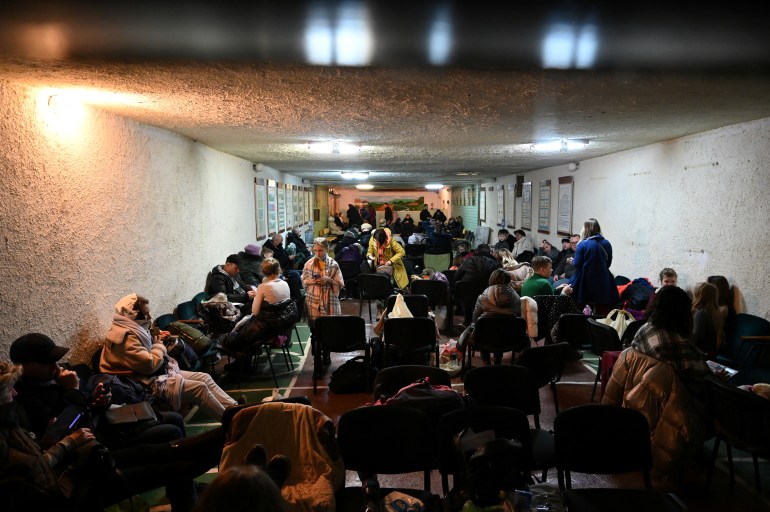Stoicism is Kyiv’s new normal
As Russian forces close in, residents still in Ukraine’s capital bear tribulation with patience, pragmatism and a bit of paranoia.

Kyiv, Ukraine – “If you switch off the emotions, the scale of damages is minimal,” a woman who lives on the 15th floor of a new apartment building in central Kyiv, told me.
Over the past week, she saw the fires and plumes of smoke caused by Russian cruise missiles that hit the central railway station in Ukraine’s capital, as well as a television tower and a residential building.
Keep reading
list of 4 items‘We don’t want to have anything common with Russians, including music’
Russia troops accused of ‘executing’ surrendering Ukraine soldiers: Report
How do American universities make their money?
Her own building towers over Kyiv and seems as vulnerable as a wheat stalk in a storm. Her family slept in their “bathroom shelter” for several days.
But she and other residents in this city of more than two million, once the Soviet Union’s third-largest, have already gotten used to the harrowing reports on the bombing, shelling, killing.
They also got used to the wailing of air raid sirens that is heard several times a day or night – and are doubled by text messages on everybody’s phones.
“See, they’re not moving any faster,” the woman said, pointing at several ant-sized people on the street a minute after the sirens’ sound filled the air again.

Patience, pragmatic stoicism and a bit of paranoia are the new normal for the people of Kyiv who preferred to stay – or could not leave.
Every day, they realise that the Russian troops, tanks and other military vehicles trying to close in on Kyiv move slower and slower.
Some suburbs have been invaded, and Russian troops fired at civilians or took them hostage.
“They took 20 people [from] here,” a resident of Makarov, a western suburb of Kyiv that withstood days of fierce fighting, told Al Jazeera.
There is a growing sense among Kyiv residents, imbued with a note of schadenfreude and relief, that the dreaded Russian military is increasingly disorganised, demoralised and undersupplied.
And yet, they are closing in.
“Russian troops fully blocked Kyiv from the west, and the circle is possible getting smaller,” Nikolay Mitrokhin, of Germany’s Bremen University, told Al Jazeera.
As Moscow has little reserves, he said, it switches to “barbarian shelling” of Ukrainian cities and towns and wants to create puppet administration in a handful of towns that have been already seized.
The Russians “are trying to get into Kyiv from northwest and northeast, Ukrainians let them in, break their columns in the forest, dissect them, destroy their rear supplies, and beat them too. The fighting is intense,” retired Lieutenant General Ihor Romanenko, Ukraine’s former deputy chief of general staff, told Al Jazeera.
But Kyiv has largely been intact, and while cities like Kharkiv and Kherson have been pounded really hard, the capital has so far gotten away with harrowing, but minuscule losses.
And life goes on.
People of Kyiv know the new schedule of supermarkets, grocery shops and pharmacies around them – and patiently wait in lines.
They know all the bomb shelters in their apartment buildings, nearby or in subway stations. Going underground seems boring and almost mechanical now – especially when a blast wakes you up at 2am.
You just get your bags and mattress and go downstairs, to the basement bomb shelter.
You watch patiently, when your neighbour’s dog barks frantically, craps and pees all over the staircase, because the dog’s hysteria mirrors the neighbour’s.
You treat your neighbours with patience and respect, because everyone knows who the true enemy is.

In the basement, your neighbours watch and read the news on their phones, call friends and relatives and post on social networks.
They exchange tips on how to duck-tape their windows and protect themselves from broken glass during bombings. They send each other photos of alleged or real marauders or spies.
They are sometimes paranoid – about strangers in the neighbourhood, especially men taking photos, about suspicious objects on the ground or graffiti on the walls.
They look and act different from their very first night of the war and the bombings, a week ago, a lifetime ago.
That night, they did not know what to do, they wept and cried and tried to calm their children. Some were calmed by their elderly parents, who, in turn, remember what their moms and dads who survived World War II used to tell them.
Ukraine is a nation of stoics. It consists of former fragments of empires – Russian, Austro-Hungarian, Polish, Ottoman.
Resistance to foreign invasions, civil conflicts and political miscalculations has become part of the collective DNA.
Ukraine lost millions during the Holodomor, or the Great Famine of 1932-33, caused by Moscow’s disastrous policies. It then lost one-sixth of its civilian population during World War II.
Waves of Stalinist purges hit Ukraine before and after the war, decimating intellectual and political elites.
The post-Soviet 1990s were traumatic and chaotic, and the Moscow-backed separatist uprising that began in 2014 killed more than 13,000 people.
Millions were uprooted, and tens of thousands of Ukrainian men went through the crucible of the front lines.
These days, many more are trained as volunteers of “territorial defence”, or potential rebel fighters who would resist the invasion.
“I can’t imagine him in a uniform, with a gun in his hand,” a friend told me about another friend who joined the territorial defence and now patrols the streets of Kyiv.